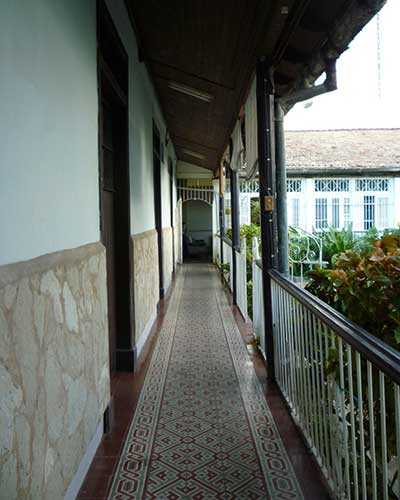Courses
Women Saints: Their Lives and Their Writings
San Diego State University, Department of Women’s Studies
Course Description
What can Joan of Arc, Teresa of Avila, Rosa of Lima, Edith Stein and others can teach all of us, regardless of our religious background or gender?
The lives and writings of selected Latin American, North American, and European female saints, particularly their resistance and accommodation to normative women's roles as well as the impact of saints on the development of national/cultural identities. Exploration of historical, cultural and ethnic perspectives, and political contexts of sainthood. Includes gender and feminist psychological analyses and critical examination of their lives. Implications for understanding gender and socio-political processes in 21st century U.S. will also be discussed.
Focus will be on the intersection of individual life histories and psychological processes with the pursuit of holiness in women. Discussion will be based on their own narratives and on hagiographic and critical analyses of their lives.
Women’s Experience of Migration
San Diego State University, Department of Women’s Studies
Course Description
Focuses on the impact of migration on the lives of women immigrants and refugees in the United States and Europe. The course analyzes the impact of intersections of gender, race, ethnicity, class and sexual orientation on the experience of migration. The focus of the course will be on discovering the voices and the life experiences of women immigrants/refugees from a variety of cultural backgrounds to understand the diversity and the commonality of the social/political histories that have produced those voices and/or silenced them. Particular emphasis will be placed on the influence of the process of migration in the construction of life narratives for women. This narrative perspective focuses on the role life stories play in the formation of identity, on the cultural conditions that may constrain or facilitate the development of such narratives, and on the effect that critical insight and engagement may have on the transformation of stories and narratives. Stories lived and stories told are influenced by what is culturally acceptable. Not only acceptable behavior but also acceptable accounts of behavior are regulated by society. When societal transformations occur or when the person moves to a different cultural context, the acceptable accounts are also transformed. We will incorporate an analysis of gender into our understanding of the impact of migration to the U.S. and other countries by analyzing the experiences of women from diverse backgrounds and cultures. We will incorporate an analysis of the economic, social, political, historical, cultural, racial and psychological forces into the understanding of the lives of women immigrants/refugees.We will look at the effect of migration and acculturation on the stories of women immigrants/refugees and on the liberatory and transformative consequences of old and new stories for the development of women's identity and possible lives.
Advanced Cultural Seminar: Psychology of Women
California School of Professional Psychology
Course Description
Focuses on theoretical understandings of the psychological development of women and their clinical applications. Traditional theories and contemporary feminist psychodynamic and social-constructionist theories of women's development will be discussed. Particular emphasis will be placed on the influence of cultural perspectives in the construction of possible life narratives for women.
We will rely heavily on a theoretical frame provided by narrative psychology. This perspective focuses on the role narratives and life stories play in the formation of identity; on the cultural conditions that may constrain or facilitate the development of such narratives; and on the effect that critical insight and engagement may have on the transformation of stories and narratives. Stories lived and stories told by people, as well as stories heard by psychotherapists, are influenced by what is culturally and theoretically acceptable. Not only acceptable behaviors but also acceptable accounts are regulated by society. When societal transformations occur, the acceptable accounts are also transformed. The individual desire and the societal possibilities both push the limits and constrain the boundaries of the lived story.
As therapists, we are interested in the development of lives, but our access to lives is through stories about them. In this course we will try to understand how the stories psychology tells about women and the stories women tell about themselves are both made possible and constrained by social constructions of reality. We will look at the effect societal transformations have on the stories told, both theoretically and personally, and on the liberatory and transformative consequences of new stories for the development of theory and the psychological development of women. Obviously, this perspective has strong implications for psychotherapy with women of all cultural backgrounds.
Privilege and Oppression: Theoretical and Practical Applications in Women’s Studies
San Diego State University, Department of Women’s Studies
Course Description
Surveys and analyzes the particularities and intersections of multiple forms of oppression and privilege, specifically gender, race, class, ethnicity, and sexual orientation, and their implications for the development of feminist theory. We will discuss feminist analyses of theories, issues and paradigms relevant to oppression and privilege, including concepts of identity, subjectivity, positionality, collusion and resistance.The focus of the course will be on how the social processes of privilege and oppression have been internalized and expressed in the life experiences of women and how the diversity and commonality of our social histories have shaped our voices.
Qualitative Research Methods
California School of Professional Psychology
Course Description
Surveys of the theory and practice of qualitative methods of research. The course will focus on principles and methods of designing psychological research using qualitative methods. It will provide a critical review of the most widely used qualitative methods of research, will focus on the theoretical underpinnings of this methodology and on the possibilities and limitations of qualitative methods. Particular attention will be given to the skills involved in designing and implementing qualitative studies (i.e., techniques of data collection, analysis and interpretation of data; questions of validity and reliability; writing up results of qualitative data). The goal of this course is to prepare students to design research studies using this methodology and to analyze qualitative literature critically.
Format
Students will become familiar with qualitative methodology through a mixture of reading and skills development activities. Assigned reading will provide a knowledge base about the essentials of qualitative research. Examples of studies that have used these methods will be provided. Skills will be developed through in-class exercises and through the design and execution of a small study on a subject of choice.
Psychology of Women
San Diego State University, Department of Women’s Studies
Course Description
Acquaints participants with some of the most prominent psychological theories and issues relating to the psychology of women. Particular focus will be placed on the effect of the social context on the development of individual psychological characteristics ( i.e., the social construction of intrapsychic phenomena). We will discuss traditional and contemporary feminist theories of women's psychology. Discussions will also include issues relevant to women's psychological development such as the interplay of race, class, culture, and gender; sexuality; mother-daughter and other relationships; violence against women; feminist approaches to psychotherapy. These issues will be approached from an international and multicultural perspective in order to develop an understanding of the commonalties and differences in the experiences of all women.
Women, Madness and Sanity
San Diego State University, Department of Women’s Studies
Course Description
Surveys theoretical and service delivery issues related to women and mental health. Particular issues to be addressed include sexism, heterosexism, and racism in the social construction of madness, issues of diagnosis and psychopathology, psychological effects of traumatic life events, women's particular treatment needs, as well as traditional and feminist approaches to psychotherapy with women.
Women have been diagnosed, treated, committed to institutions (or burned at the stake) for symptoms of madness. For the most part, those holding the power to label, treat, and commit have been middle/upper class, heterosexual males of European descent. The feminist movement and feminist psychology and psychotherapy struggle to develop a feminist understanding of women who does not conform unquestioningly to societal standards of sanity.
This course will focus on the historical and cultural factors and behaviors that have been associated with madness in women as well as on culturally appropriate forms of finding sanity and women's efforts to make sense of female experiences.
Advanced Feminist Theory
San Diego State University, Department of Women’s Studies
Course Description
Analysis of categories of contemporary feminist theory including concepts of identity and difference; theories of subjectivity; feminist discourses, strategies and practices. This course is "advanced" because it assumes that students will have background in feminist theory and analysis. Thus, there will not be reviewing of basic feminist terms, politics or theoretical schools. The course assumes the basic stance of viewing the world through the lens of gender. It seeks to interrogate and understand theoretical assumptions based on a shared support for the general goals of women-centered education and politics.
Throughout the course you will be asked to outline and analyze readings, evaluate their arguments, weigh their value in terms of your own education and experiences, and incorporate them into your own world view, scholarship, and political/social activism. The readings are challenging and provocative to give each of us additional tools with which to instigate academic and social change. The readings are intertextual, with one essay referring to and arguing with another. That should forestall any tendency to take any article on face value. Some of the readings are "classic", others provide newer perspectives that reflect the development of feminist theory.

Women As Spiritual Teachers (with Special Emphasis on Catholic Women Saints)
California School of Professional Psychology, San Diego Campus
Course Description
Draws widely from the voices of women mystics and spiritual teachers, on history and mythology, and on feminist theory and the psychology of women. Exploration of historical, cultural, and political contexts of sainthood and perceptions of holiness for women. Particular emphasis will be placed on Roman Catholic women saints as a case study. Focus on common and dissimilar psychological processes among the women and on their resistance and accommodation to normative women's roles. Study of the lives and writings of Latin American, North American, and selected European women saints. Feminist and psychological analyses of their narratives and of hagiographic and critical analyses of their lives.
Women of Latin America
San Diego State University
Course Description
Surveys the interplay of social change processes (e.g., historical/political events) and other factors (e.g., race, class, ethnicity, religion and gender) in the lives of Latin American women. The course analyzes the particularities and intersections of multiple forms of oppression and liberation, (e.g., political circumstances, gender, race, ethnicity, class and sexual orientation) that affect the lives of women in Latin America, and assesses the various theoretical frameworks which have been advanced in understanding their situation.
The focus of the course will be on discovering the voices and the life experiences of women from a variety of cultural backgrounds and Latin American countries in order to understand the diversity and the commonality of the social histories that have produced those voices. Particular emphasis will be placed on the influence of socio-cultural perspectives in the construction of possible life narratives for women. We will rely heavily on a theoretical frame provided by narrative studies. This perspective focuses on the role narratives and life stories play in the formation of identity, on the cultural conditions that may constrain of facilitate the development of such narratives, and on the effect that critical insight and engagement may have on the transformation of stories and narratives. The individual desire and the societal possibilities both push the limits and constrain the boundaries of the lived story. We will look at the effect societal transformations have on the stories told, both theoretically and personally, and on the liberatory and transformative consequences of new stories for the development of Latin American women's lives.
Women, Race and Class
San Diego State University
Course Description
Surveys the interplay of race, class, ethnicity and gender in the lives of women, with particular emphasis on the experience of women of color in the United States. The course analyzes the particularities and intersections of multiple forms of oppression, specifically gender, race, ethnicity, class and sexual orientation, and assesses the various theoretical frameworks which have been advanced in understanding the oppression of women of color and women in the "Third World." The focus of the course will be on discovering the voices and the life experiences of women from a variety of cultural backgrounds in order to understand the diversity and the commonality of the social histories that have produced those voices. Particular emphasis will be placed on the influence of socio-cultural perspectives in the construction of possible life narratives for women. We will rely heavily on a theoretical frame provided by narrative studies. This perspective focuses on the role narratives and life stories play in the formation of identity, on the cultural conditions that may constrain or facilitate the development of such narratives, and on the effect that critical insight and engagement may have on the transformation of stories and narratives.
Stories lived and stories told are influenced by what is culturally acceptable. Not only acceptable behavior but also acceptable accounts of behavior are regulated by society. When societal transformations occur, the acceptable accounts are also transformed. The individual desire and the societal possibilities both push the limits and constrain the boundaries of the lived story. We will look at the effect societal transformations have on the stories told, both theoretically and personally, and on the liberatory and transformative consequences of new stories for the development of women's identity and possible lives.
Privilege and Oppression: Gender, Ethnicity, Race and Class in Women’s Lives
University of Innsbruck, Austria
Course Description
Surveys and analyzes the particularities and intersections of multiple forms of oppression and privilege, specifically gender, race, class, ethnicity, and sexual orientation, and their implications for theory development in feminist psychology. The workshop will provide a conceptual frame for the psychology of all women from the perspective of experiences of privilege and oppression. The focus of the course will be on how privilege and oppression have been internalized and expressed in the life experiences of women from different backgrounds in order to understand the diversity and commonality of the social histories that have shaped or repressed their voices.
Cross-Cultural Psychology: The Delivery of Psychological Services
California School of Professional Psychology, San Diego Campus
Course Description
Reviews the function of culture and ethnicity as psychological variables and the impact of therapist ethnicity on the delivery of mental health services. The focus will be on helping students relate cross-cultural psychology theory to the delivery of psychological services. Primary source materials will be writings by psychologists and other mental health professionals who have tried to address cross-cultural issues in the psychodiagnosis, psychotherapy, and community psychology literature.
Cultural Seminar: Therapy with Bilinguals
Adler School of Psychology, Chicago, Illinois
Course Description
Acquaints participants with a model to understand the role of language in psychotherapy with fluent bilingual individuals. Implications of the use of first or second language in therapy. The role of language in the formation of identity will receive special attention. Effective therapeutic and psycho-educational approaches to psychotherapeutic work with bilingual clients will be discussed.


